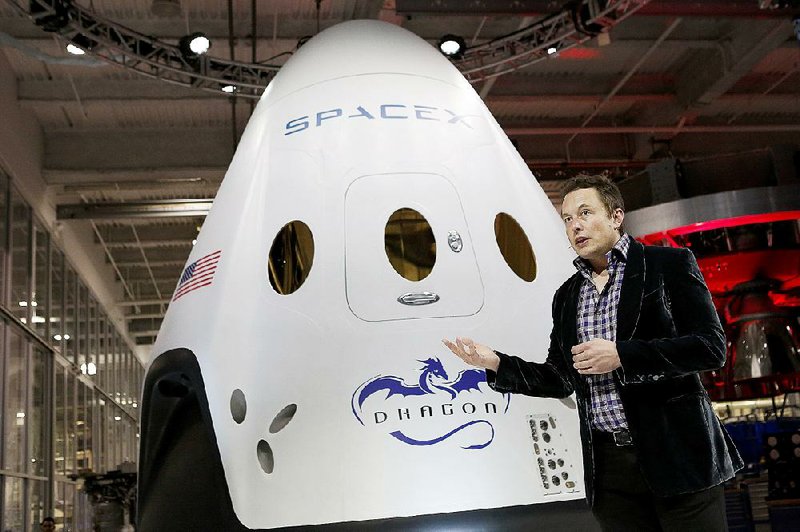Elon Musk's SpaceX stands to win more than the right to compete for U.S. satellite launches after the Air Force certified its Falcon 9 rocket for military missions.
With Congress limiting a competitor's use of Russian-made rocket engines, Space Exploration Technologies Corp. and its U.S.-built Falcon 9 is positioned to emerge as the sole carrier for some government payloads later this decade.
This year's defense reauthorization act restricts the Boeing Co.-Lockheed Martin Corp. venture to adding just five more RD-180 engines from Russia for its Atlas V vehicles. The alliance's decision to end production of a similar, American-powered rocket, the Delta IV, may leave the group without a craft to challenge Musk.
"If they can only launch a few more times, then for all practical purposes over three to five years we could go back to having a monopoly," said Marco Caceres, director of space studies with Teal Group, a Fairfax, Va.-based consultant. "Except this monopoly will belong to SpaceX."
That restriction took on new significance with SpaceX's approval Tuesday for military launches, capping months of effort by the closely held company to go beyond civilian government missions. SpaceX declined to comment.
U.S. Defense Secretary Ashton Carter and intelligence chief James Clapper have asked lawmakers to clarify the provision to allow the use of as many as 18 RD-180 engines that United Launch Alliance had pledged to buy before Russia annexed Crimea and intervened in Ukraine.
While Musk has said he's competing to end a monopoly on military space launches, Air Force Secretary Deborah James said in April that SpaceX may become the sole provider of medium-lift launches after 2018.
United Launch Alliance, which has enjoyed a lock on sensitive government launches since Boeing and Lockheed teamed up in 2006, is now urging lawmakers to ensure the military market stays competitive.
"We share the Department of Defense and intelligence community's view that without greater flexibility to use the RD-180 engines ULA has on contract, the country could face a very serious national security gap," Jessica Rye, a spokesman for the joint venture, said in an email.
Sen. John McCain, who with Musk wants to limit the U.S. space industry's reliance on Russian-made engines, has urged Air Force officials to step up development of an American-made power plant by decade's end.
"If the Air Force is unwilling to do what's necessary to meet the 2019 deadline, they are going to have to figure out how to meet our space launch needs without the RD-180," McCain, a Republican from Arizona, said in March. "Continued reliance on Russian rocket engines is unacceptable, and it's time the Air Force conduct itself accordingly."
SpaceX has fought for a role in military launches, which include satellites that let troops communicate on battlefields. The market, estimated at about $70 billion through 2030 by the U.S. Government Accountability Office, is the largest in a field that also includes civilian contracts such as work SpaceX does for the National Aeronautics and Space Administration.
Competition may heat up soon, with the entry of SpaceX to the market expected to put pressure on prices. The first contest is slated for June, when the Air Force said it will issue a request for proposal to launch a global positioning system satellite.
SpaceX plans to charge less than $100 million for military missions on its Falcon 9 rocket, Chief Operating Officer Gwynne Shotwell told a U.S. House of Representatives sub-committee in March.
The Boeing-Lockheed group charges $160 million or more for the comparably sized Atlas V, according to Caceres.
SpaceX's certification "is going to force ULA to be much more competitive on price, but still maintain their high standards on performance," Caceres said in a phone interview Tuesday. "This does jar the door open for SpaceX. It's theirs to lose. They have a vehicle that's proven and about half the price of the nearest competitor."
Musk's venture already has a full launch schedule and the Falcon 9 is limited in its capacity to haul heavy payloads, said Scott Pace, director of George Washington University's Space Policy Institute.
"The immediate impact is probably not great," Pace said in a phone interview, since upcoming satellite contests are weighted to a larger vehicle. "Longer term, it's a huge strategic change, which is good not only for SpaceX, but the U.S. launch industry."
Information for this article was contributed by Tony Capaccio of The Associated Press.
Business on 05/29/2015
